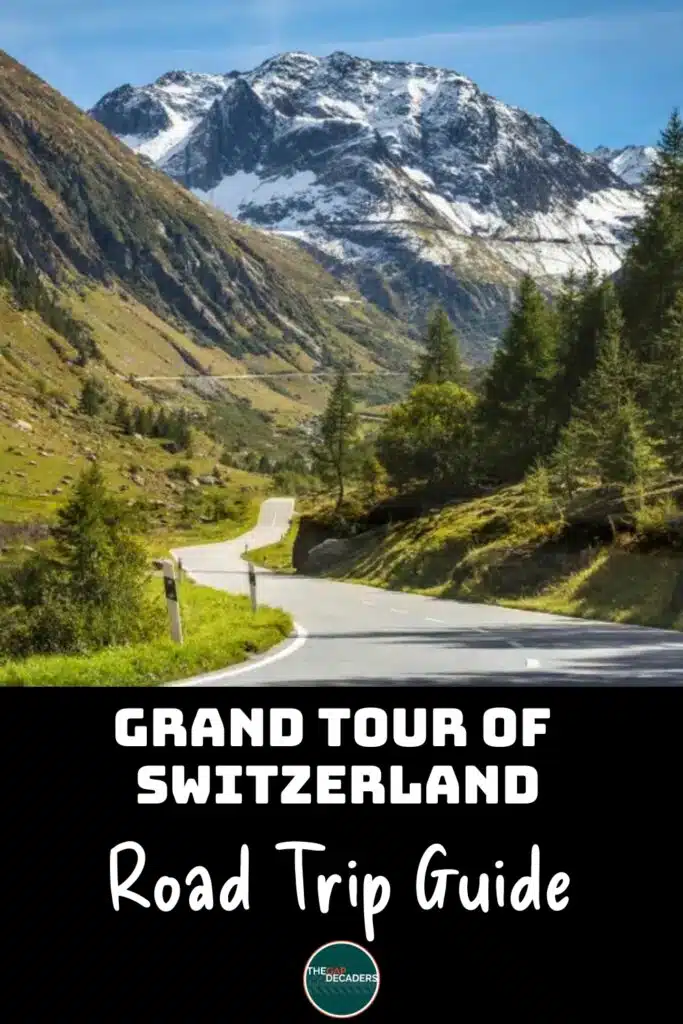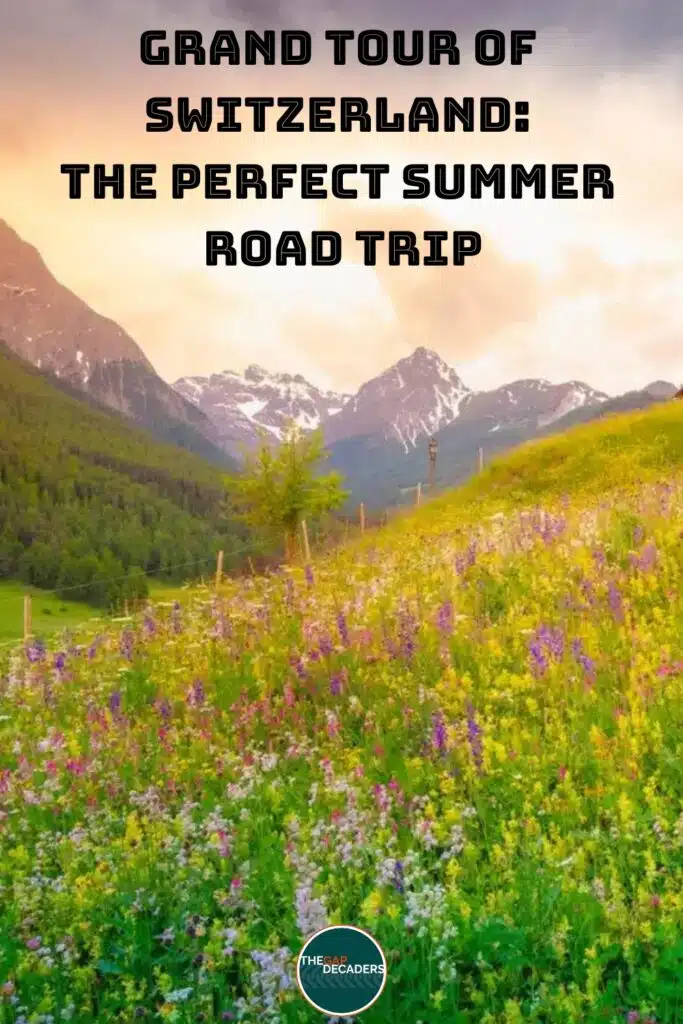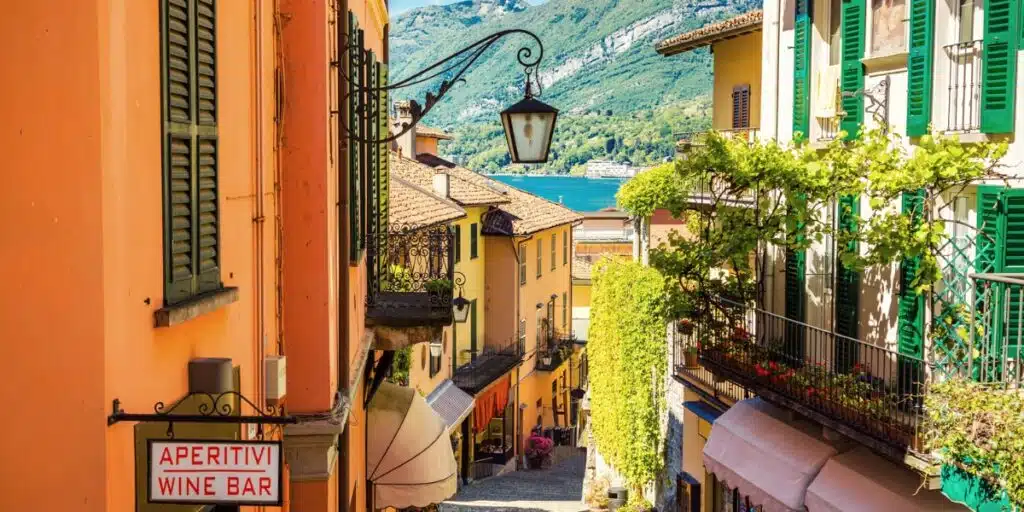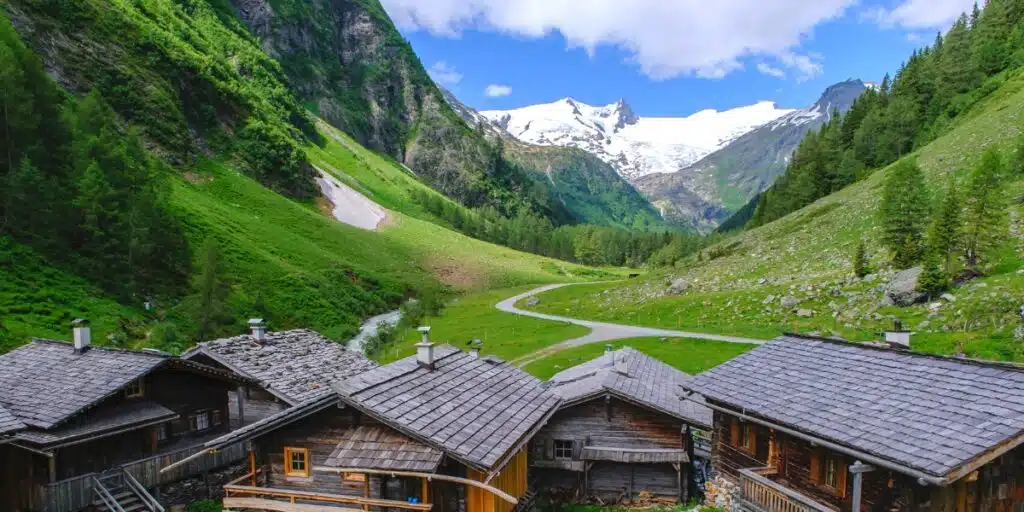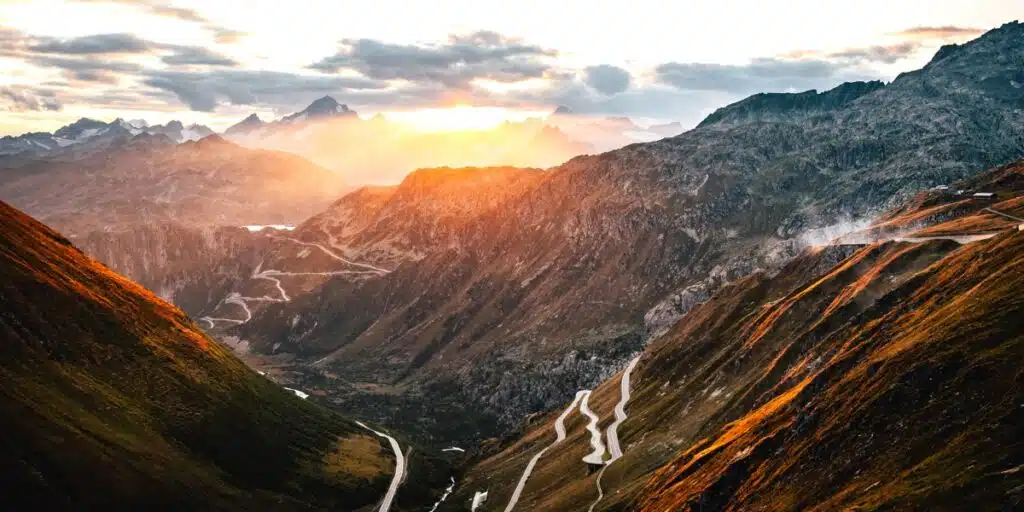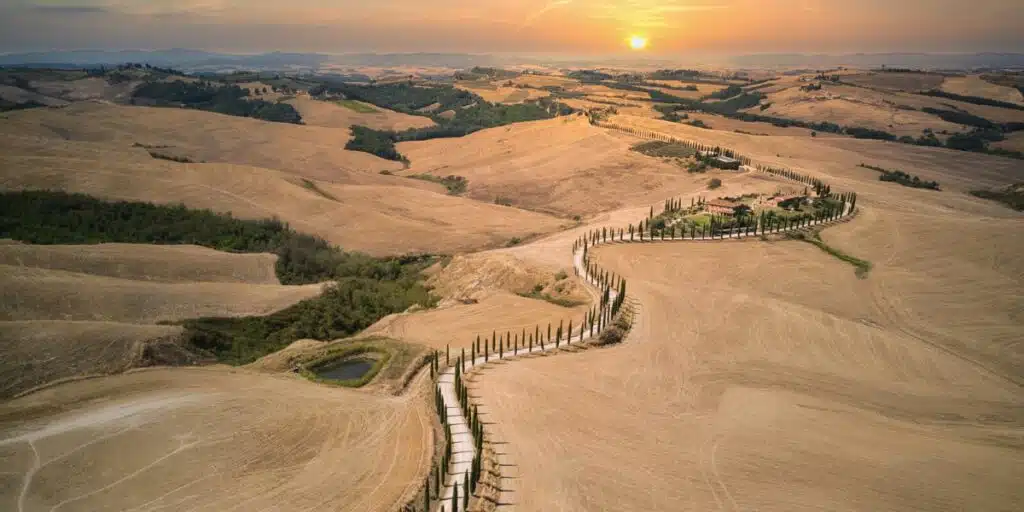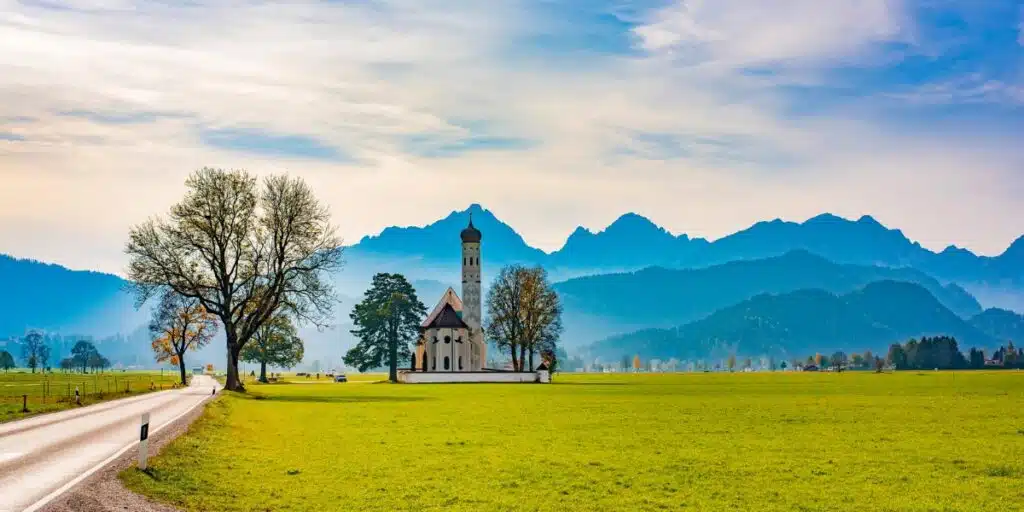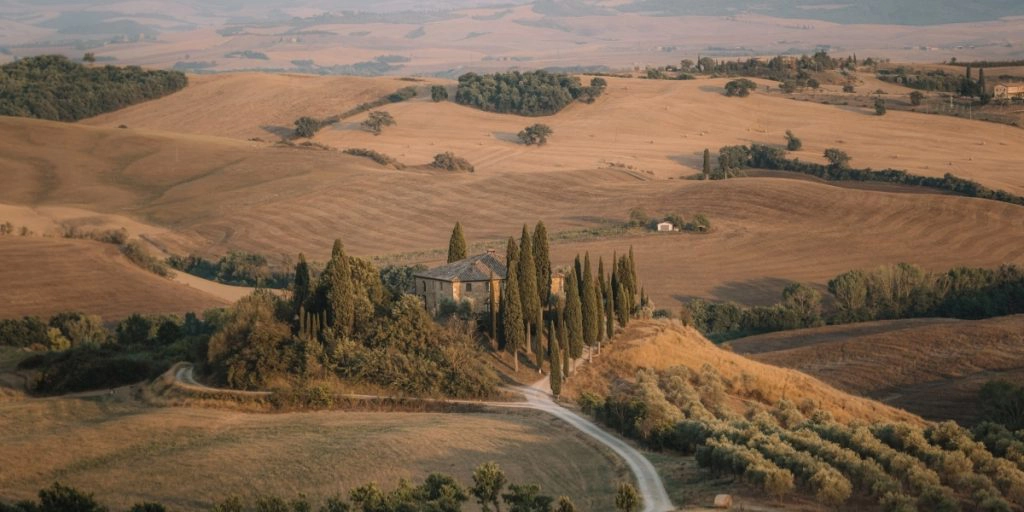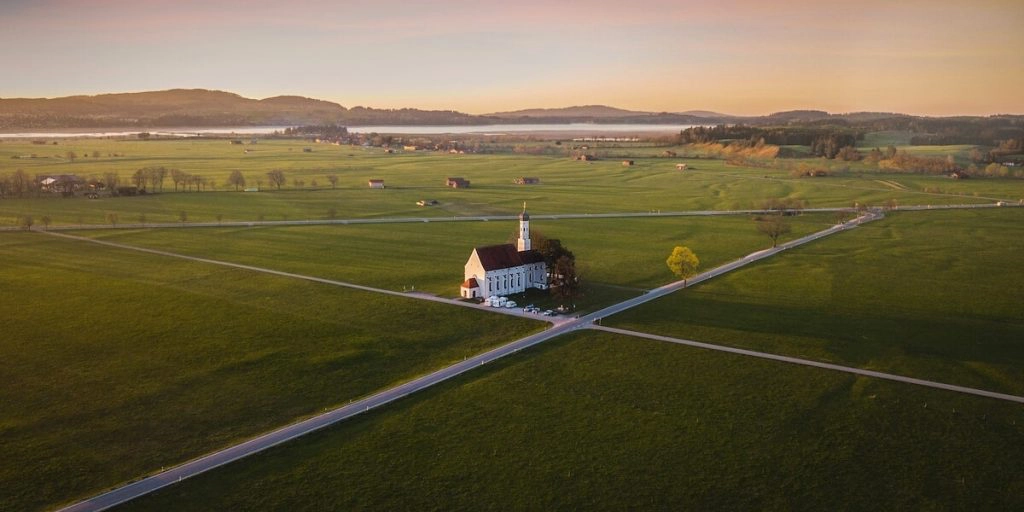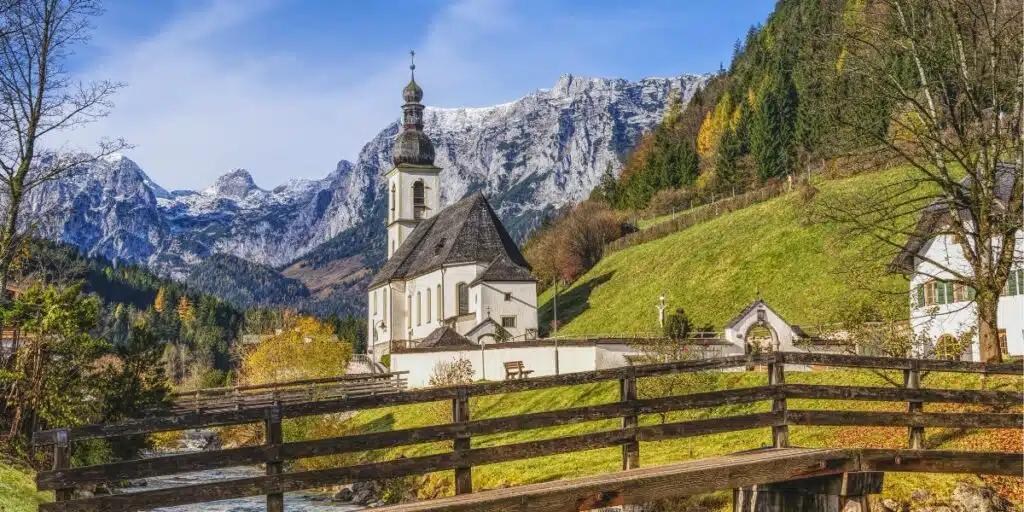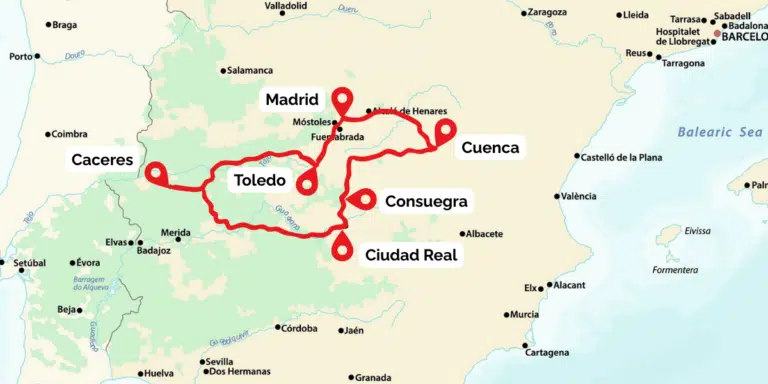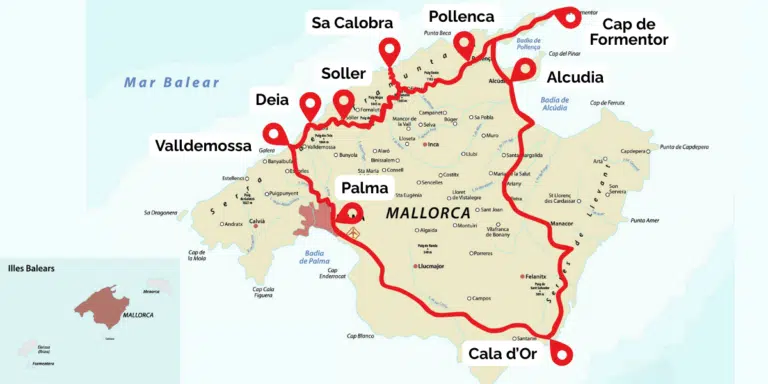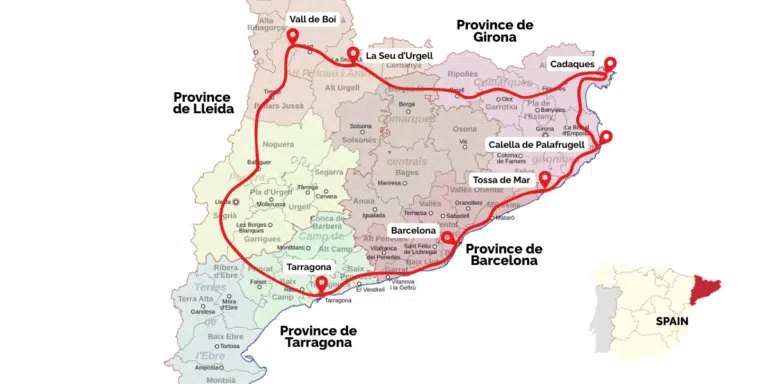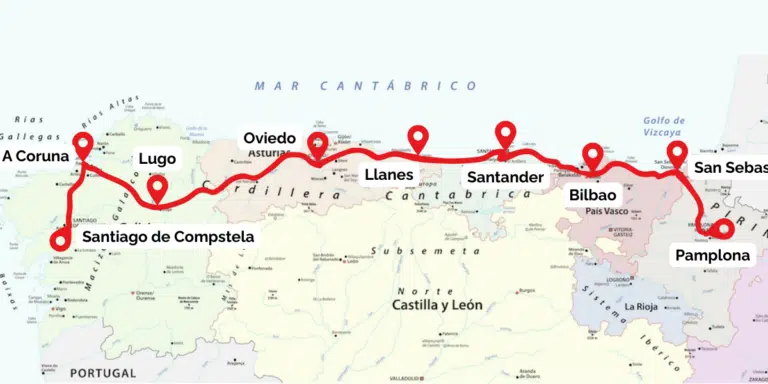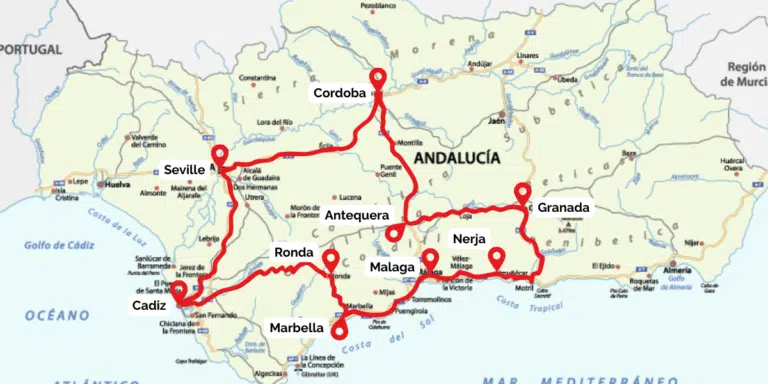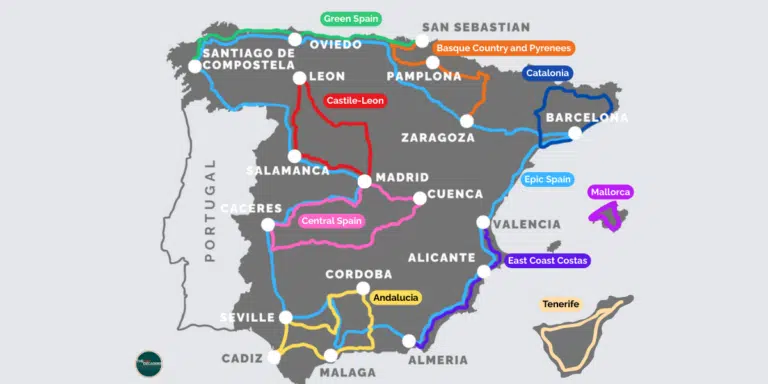This post may contain affiliate links, from which we earn an income. Click here to read our affiliate policy.
Driving the Grand Tour of Switzerland is like stepping into a living postcard. The country beckons travelers with its pristine Alpine landscapes, medieval villages, and cultural experiences.
For those seeking to uncover the essence of this enchanting country, there’s no better way than to embark on the Grand Tour through the heart of the Swiss Alps, where snow-capped peaks rise majestically against the clear blue sky.
Join us as we explore the Grand Tour of Switzerland and the country’s highlights along a driving route that promises breathtaking landscapes, gourmet delights, and unforgettable adventures at every turn.
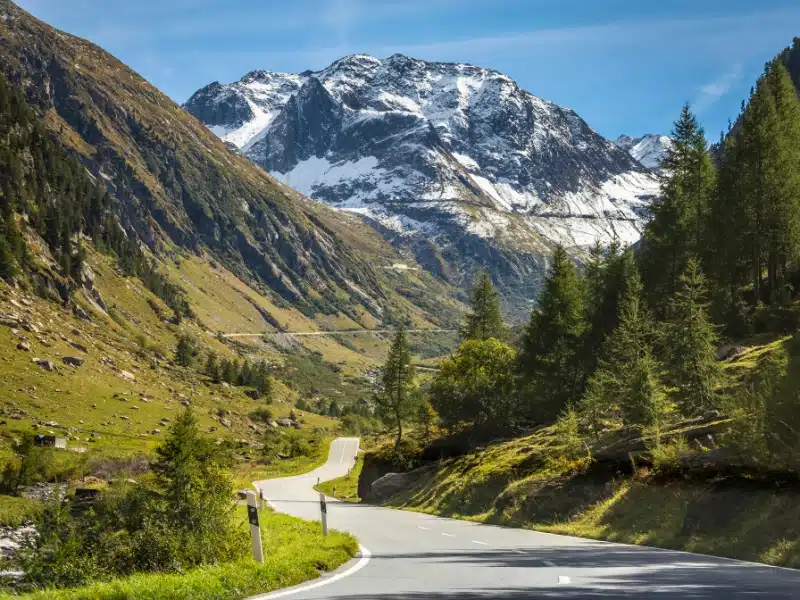
What is the Grand Tour of Switzerland?
The Grand Tour of Switzerland is a scenic road route that spans approximately 1,600 kilometers (994 miles) across Switzerland. It’s designed to showcase the country’s diverse landscapes, cultural attractions, and iconic landmarks.
The Grand Tour route typically starts and ends in Zurich, taking travelers through charming villages, vibrant cities, serene lakes, and breathtaking mountain passes. It’s a popular route for road trips and motorcycle tours, offering opportunities for outdoor activities such as hiking, skiing, and mountaineering.
How to Travel the Grand Tour Route
Whether you’re in a car, motorcycle, campervan, or motorhome, self-driving is absolutely the best way to explore Switzerland’s Grand Tour, meaning you can stop whenever you want, try new activities, visit places you see along the route, and have the freedom to change plans at the last minute.
Fly into Zurich Airport to start your Switzerland Grand Tour. With direct flights from America, Europe, and the UK, we recommend booking through Skyscanner for live deals and the best prices.
Are you planning to rent a car in Switzerland? As one of the largest car hire aggregator companies in the world, we recommend Rentalcars.com because they have massive purchasing power which enables them to secure the best car rental prices, which benefits you when you’re planning a road trip.
For a real adventure, hire a motorhome or campervan in Switzerland. We recommend Motorhome Republic, an aggregate booking site who pull together all the best deals from a number of rental agencies, to offer you a wide choice of options alongside an excellent English speaking expert motorhome Concierge Team.
Traveling in Switzerland by Car
The Swiss make it easy to see their breathtakingly beautiful country, with great roads and a well-managed network of trains, boats, and cable cars. It’s surprisingly easy to see the mountains and gain real elevation without being a super-fit hiker – everywhere you go, there are mechanical means to help you enjoy the peaks.
Although this is a Grand Tour road trip guide, you will definitely be using trains, cable cars, and boats to see some of the top sights and attractions. A virtual Swiss Travel Pass offers unlimited travel on all Swiss trains, buses, and boats and discounted or free admission to many Swiss attractions, including museums and mountains, and we highly recommend getting one of these cards for your trip.
Make sure you have travel insurance you can trust when visiting Switzerland. We recommend True Traveller for their 5-star TrustPilot reviews, variety of cover options, best activities cover as standard, great prices, and excellent service.
Switzerland Grand Tour Map & Route
The Grand Tour can be driven in either direction, but the Swiss Tourism Federation recommends driving it clockwise. Our route is also clockwise because that’s how we drove it!
This road trip requires a minimum of ten days, but we have also added a number of awesome side trips if you can stretch your itinerary to two weeks.
Zurich – Appenzell – St. Moritz – Lugano – Zermatt – Lausanne – Neuchâtel – Basel – Lucerne
How to use this map – Use your fingers (or computer mouse) to zoom in and out. Click or touch the icons to get more info about a place, and click the arrow in the box top left to open the index. To add to your own Google Maps account, click the star next to the title of the map.
Day 1: Zurich
The Grand Tour of Switzerland should ideally start with one full day in Zurich. This allows time for arrival from other destinations and allows you to maximize the city’s offerings.
An excellent place to start exploring Zurich is in the charming old town center, the Alstadt. Here you can visit the Romanesque Grossmünster and Fraumünster churches. The latter boasts five windows created by the famous artist Marc Chagall. Keeping with the art theme, visit the Kunsthaus Zurich Art Museum and the Rietberg Museum.
Stroll through the old Niederdorf district to see some of the original Zurich architecture. The area also has excellent coffee shops and restaurants. If you want to go on a luxurious shopping spree, head to Bahnhofstrasse.
For some fresh air, go for a hike or boat tour. Uetliberg is 2,850 feet above sea level, and the hike will take about 1.5 hours. The reward is panoramic views of the city and beyond. Or you can take a boat tour of Lake Zurich or the Limmat River to see the magnificent landscapes, including the Swiss Alps.
If you prefer to have your day arranged for you, check out this popular and highly-rated private tour with a local guide and learn about the beautiful city of Zurich with a professional guide who will show you the city’s top attractions and hidden gems.
Zurich has several Michelin-star restaurants, such as Restaurant Weisses Rossli and Restaurant La Soupiere. For a more moderately priced yet equally enjoyable experience, you can opt for Iberia Tapas or the traditional Swiss restaurant Zeughauskeller.
Rhine Falls Side Trip
Just under an hour away from Zurich are the Rhine Falls, the largest waterfall in Europe. At 150m (492 ft) wide and 23m (75 ft), over 600,000 liters of water per second plunge over the falls in the summer.
If you prefer not to drive, there are many day trips to the Rhine Falls from Zurich, but we think this highly recommended Rhine Falls day trip from Zurich is the best.
Where to Stay in Zurich
Luxury: The Marktgasse Hotel is in the heart of Zurich’s historic Old Town and offers a unique blend of modern comfort and historic charm in a building dating back to the 13th century. Rooms are elegantly appointed, and service is exceptional, making the hotel our top pick for Zurich.
Mid-Range: The Opera Hotel in the vibrant Seefeld district is just a stone’s throw from the renowned Zurich Opera House. This boutique hotel blends contemporary design with a touch of classic charm and has a warm, welcoming atmosphere.
Budget: Hotel Marta is a delightful budget-friendly option in the lively Niederdorf district, offering comfort and convenience. This charming hotel is known for its minimalist, modern design and warm hospitality.
RELATED POST: One Day in Zurich – Itinerary, Map, Tips & Guide
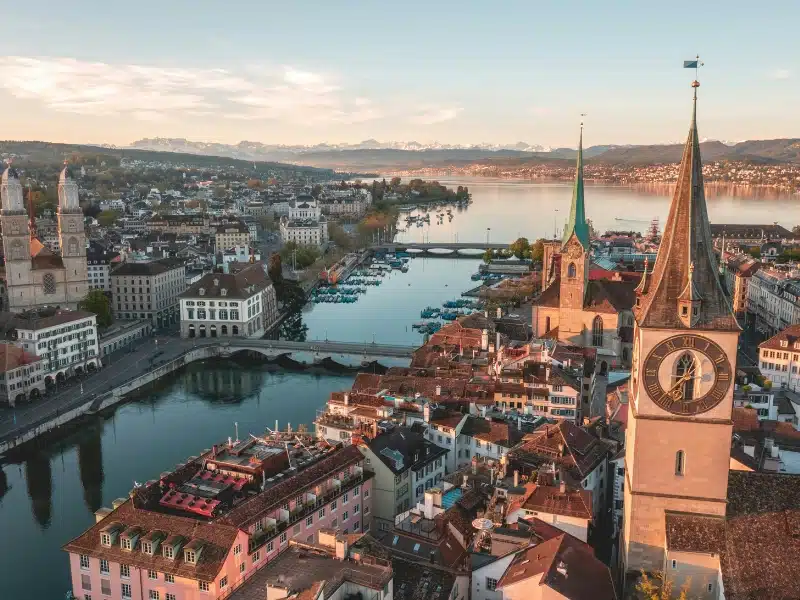
Looking for the best SIM card deals in Europe for your trip? Check out our guide to the best data SIMs in Europe and get the best deal for your trip to Switzerland.
Day 2: Zurich to Appenzell
Winterthur
Winterthur lies about 15 miles northeast of Zurich and is known for being a technology hub. This relationship with technology is evident at Technorama, a science center that allows visitors of all ages to get hands-on experience with natural phenomena and technologies.
Another highlight is the Fotomuseum, which exhibits works of young and established photographers, as well as the Kunst Museum and Oskar-Reinhart Foundation Museum.
The pedestrian zone in the charming Old Town is one of Switzerland’s largest. Beautiful architecture can be found in and around the Marktgasse, the City Church, the Fisher Maiden’s Fountain, and the famous Town Hall Passage.
Enjoy a traditional lunch at Obergass before moving on to Appenzell.
Appenzell
Appenzell is a village known for its cheese and beer production and wooden houses with colorful facades.
For a taste of local cheese, visit the Appenzeller Cheese Factory to purchase some or take a tour to see the making of this tasty cheese. If you pass through Appenzell in October, you can enjoy the annual cheese festival. Besides cheese, Appenzell is also famous for its beer. You can sample some local brews at Appenzeller Brewery.
To experience the natural surroundings, you can hike up Mount Santis, the highest peak in the Alpstein; take a cable car (The Kronberg or Hoher Kasten) to the top of Ebenalp to visit the the Wildkirchli cave complex and enjoy panoramic views of the Swiss Alps; or take a scenic drive along the Schwägalp, Appenzell’s most famous mountain pass, because of its stunning views.
After a long day, enjoy dinner at Gass 17 or Restaurant Hof to taste the local cuisine.
Where to Stay in Appenzell
Luxury: The Adler Hotel is known for its charming Swiss architecture and stunning natural surroundings. This historic hotel, with roots dating back to the 16th century, offers guests a warm and inviting atmosphere combined with modern amenities in a central location.
Mid-Range: Centrally located, Hotel Löwen offers warm traditional Swiss hospitality. Its comfortable rooms blend rustic charm with modern facilities.
Budget: Landgasthof Sternen in nearby Bühler offers a peaceful stay in the scenic Appenzell countryside. This charming inn, steeped in history and surrounded by rolling hills, provides guests with a true taste of Swiss hospitality.
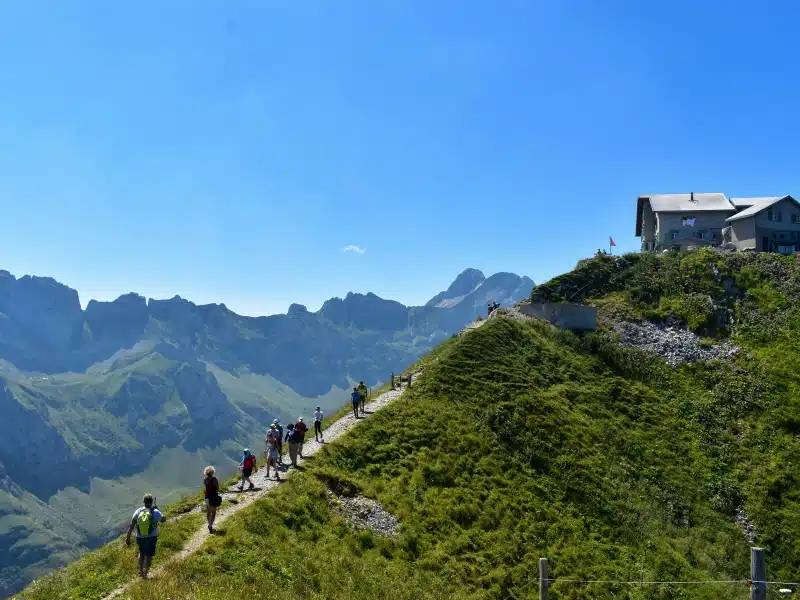
Day 3: Appenzell to St. Moritz
Chur
About 48 miles from Appenzell is Switzerland’s oldest city, Chur. Walk through the old town to see the 8th century St. Martin’s Church, one of the oldest churches in Switzerland, and go to Obere Gasse to shop for souvenirs and local arts and crafts.
Chur is also famous as the start point on the iconic Bernina Express, a scenic narrow guage railway which travels through viaducts and tunnels between the city and Tirano in Italy.
Other architectural marvels include the Chur Cathedral and the 16th century Haldenstein Castle. The latter is located just outside of the city center and offers visitors tours and access to beautiful gardens.
See if you can find a table at Veltliner Weinstube Z Stern in Hotel Stern to enjoy a tasty regional lunch.
St. Moritz
En route to St. Moritz, about 22 miles from Chur on the E43, stop to see the Solis Viaduct. It is a single-track arched limestone bridge built in 1902 that carries the UNESCO Albula railway line between Thusis and Tiefencastel.
Towards the end of the drive, you’ll cross the Julier Pass at 2.287m (7,503 ft), one of Switzerland’s most scenic Alpine passes.
Once in St. Moritz, make the most of the town’s stunning natural scenery by hiking or walking along Lake St. Moritz. If you travel between December and March, opt for sports like skiing or snowboarding. St. Moritz has several good ski resorts, including Corviglia, Zuoz (suitable for family trips), and Diavolezza.
If you prefer a less strenuous day of exploring, walk through the charming old town with several shops, restaurants, and museums. Visit the Engadiner Museum or Segantini Museum to see the works of Italian painter Giovanni Segantini. Alternatively, choose a horse-drawn carriage ride to avoid exploring the town on foot.
For some yummy Italian cuisine try Banfi’s (try the steak tartare!) or Riccardo’s St.Moritz.
Where to Stay in St. Moritz
Luxury: Hotel Grace La Margna is a sumptuous hotel offering a blend of elegance, comfort, and breathtaking natural beauty. The historic hotel combines traditional Alpine charm with modern sophistication with elegantly furnished rooms and suites, many of which have stunning views of the surrounding mountains or the serene Lake St. Moritz.
Mid-Range: Lakeside Hotel Waldhaus am See is a historic hotel with breathtaking views of the surrounding Engadine mountains and the lake’s crystal-clear waters. The hotel is just a five-minute walk from the train station, making it an ideal spot to explore the surrounding area.
Budget: Hotel Stille is a family-run hotel just outside town that provides comfortable rooms with a touch of traditional Alpine charm. The rooms are tastefully decorated and equipped with modern amenities, ensuring a relaxing stay.
RELATED POST: Most Beautiful Places In Switzerland That You Must Visit!
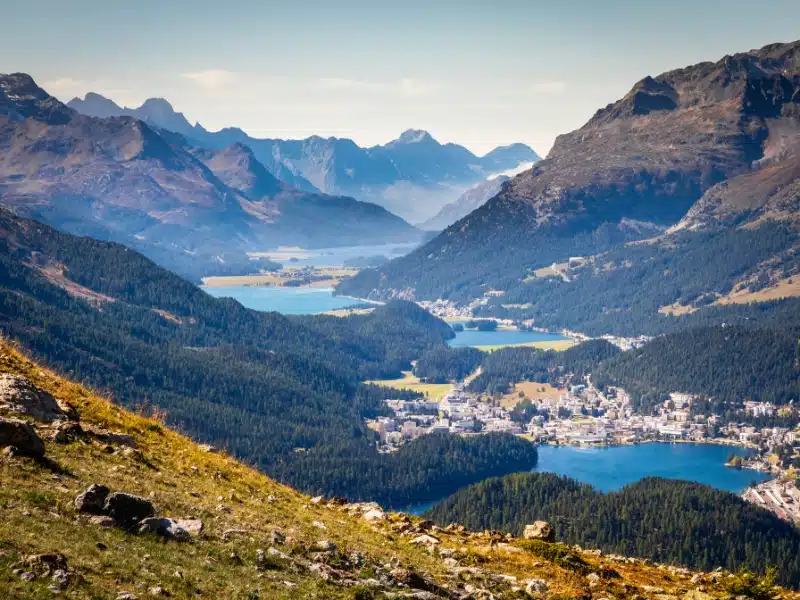
Don’t forget your road trip essentials! Our free road trip checklists help you remember everything, including road trip snacks, podcasts, and road trip songs for the journey!
Day 4: St. Moritz to Lugano
Bellizona
About 1 hour 45 minutes into your drive to Bellizona, stop on the San Bernardino Pass, which peaks at 2,066 meters (6,778 ft), at Ristorante Ospizio S. Bernardino for a coffee and the chance to stretch your legs. Less than a mile from the restaurant, take the opportunity to capture the surroundings at the San Bernadino lookout point, one of the many Grand Tour of Switzerland photo spots.
Bellinzona is a beautiful Italian-speaking town famous for its three castles, Sasso Corbaro, Montebello, and Castelgrande, which are listed amongst Switzerland’s 13 UNESCO World Heritage Sites. Castelgrande also hosts the Castello Museum, where you can learn about the history of Bellizona and the Ticino region.
If you are a music enthusiast, plan your road trip for June to October, when you can catch some of Bellizona’s many cultural events, such as the Blues Festival, Film Festival, and Jazz Festival.
For lunch, try a fusion of Swiss and Italian cuisines at the family-owned Pedemonte or the Michelin-star Locanda Orico.
Lugano
Lugano, a short ride from Bellizona, has a blended Swiss-Italian culture apparent in its architecture and cuisine. This comes from its position on Lake Lugano, which straddles the Italian-Swiss border.
Visit the Cattedrale di San Lorenzo and the 16th century Santa Maria degli Angioli to see exquisite interiors, including stained-glass windows and breathtaking frescoes. To explore more art, head to the MASI Lugano (Museum d’Arte della Svizzera Italiana), which houses a modern and contemporary art collection, or attend a show at the Lugano Arte e Cultura.
For stunning city views, take the funicular up Monte San Salvatore or Monte Brè. If you are traveling as a family during the spring or summer months, the Swiss Miniature Park is also a must-do. It exhibits tiny versions of famous landmarks, towns, and villages.
Stroll through the old town’s narrow streets for luxury shopping and dinner. Some of the best restaurants in Lugano include Ristorante Camino (great outdoor seating), Agape, or Ristorante le Bucce di Gandria, which overlooks the lake.
Where to Stay in Lugano
Luxury: Grand Hotel Villa Castagnola is a luxurious oasis on the shores of Lake Lugano, offering guests an unparalleled blend of elegance, tranquility, and Mediterranean charm. This historic hotel, set in a beautifully restored 19th century villa, is a perfect spot for travelers seeking luxury in Lugano.
Mid-Range: Hotel De La Paix is a refined boutique hotel in the heart of the city that combines modern comfort with timeless elegance. Situated near Lake Lugano and the picturesque Parco Ciani, this hotel boasts stylishly appointed rooms and suites, many of which offer stunning views of the lake and surrounding mountains.
Budget: Villa Sassa Hotel is centrally located and surrounded by lush gardens with a lakeside view. Offering a pool and spa, comfortable modern rooms, and top-class amenities, this is a great spot in Lugano if you’re visiting on a budget.
RELATED POST: Best Cities in Switzerland to Visit & Fall in Love With!
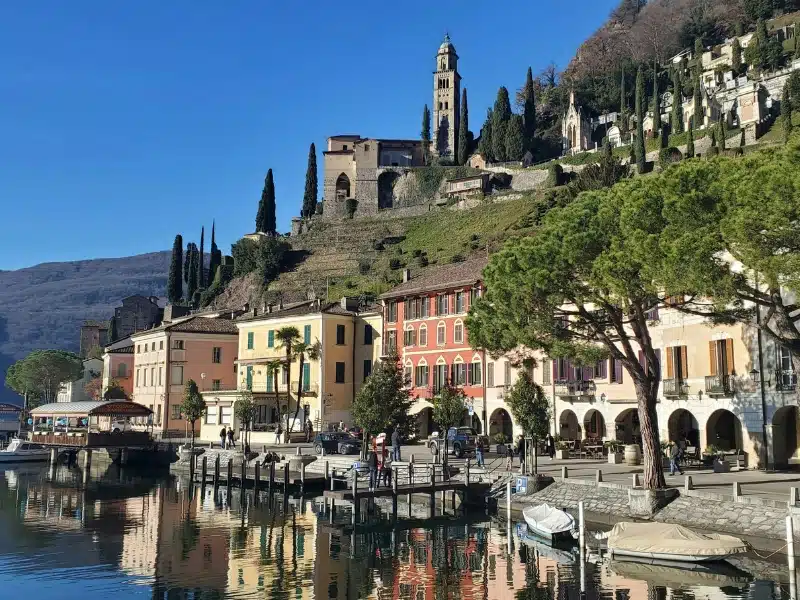
Day 5: Lugano to Zermatt
Göschenen
About halfway en route to Zermatt via the E35 is the small village of Göschenen. Here, you can see the historic Devil’s Bridge on the Gotthard Pass, dating back to the 13th century. A bonus is the beautiful mountainous surroundings and Schöllenen Gorge near the bridge, which is perfect for hiking.
Go on the Rundgang Gotthardtunneldorf (Gotthard tunnel village tour), which starts at the Göschenen train station and is free between May and October.
Drive 10 minutes south to Andermatt for lunch, where you can dine at Berggasthaus Dammagletscher for great views or the incredible Michelin-star The Restaurant at The Chedi Andermatt.
Furka Pass
One of the most iconic Alpine passes on this route, the Furka Pass, is a must-visit destination for anyone traveling to the Swiss Alps. Its role in the James Bond movie Goldfinger has given it international fame, and as you drive around the hairpin bends, you’ll feel like you’re in your personal action film!
The Furka Pass, at 2,430m (7,972 feet), is one of the highest mountain passes in Switzerland. It offers stunning views of the surrounding peaks and valleys.
Due to heavy snow at this elevation, the Furka Pass opens in summer, from June through October, and will appear closed on our interactive map if you plan your route outside the summer. When the road is closed, or if you prefer not to drive the pass, you can transport your rental car by train using the Furka Base Tunnel that connects Realp and Oberwald.
The roads ascending and descending the pass are steep, narrow, and winding, so driving cautiously is important, especially if you’re not used to mountain driving.
Zermatt
About 95 km (60 miles) further south is Zermatt, a car-free town. You need to leave your car at one of the parking facilities in nearby Täsch. From there, Zermatt is 12 minutes by train, or you can grab a taxi direct to your hotel.
You probably won’t arrive in Zermatt until late in the afternoon. Just in time to relax in one of Zermatt’s many spas and wellness centers and treat yourself to dinner at L’Atelier Grandsire or Saycheese!
Where to Stay in Zermatt
Luxury: The Hotel Schweizerhof Zermatt is a quintessential Swiss retreat that combines Alpine charm with modern comforts, offering guests a cozy and inviting atmosphere. The rooms and suites are elegantly furnished, featuring stunning views of the Matterhorn, one of the most iconic peaks in the Alps.
Mid-Range: Le Mirabeau Hotel & Spa offers guests a blend of elegance, comfort, and stunning mountain views. This well-located boutique hotel enjoys contemporary design and spacious and elegant rooms.
Budget: Hotel Bahnhof is a cozy, centrally located hotel that offers a comfortable stay in Zermatt. Situated just a short walk from the railway station and the Gornergrat railway, this family-run hotel provides easy access to skiing and hiking adventures in the surrounding mountains.
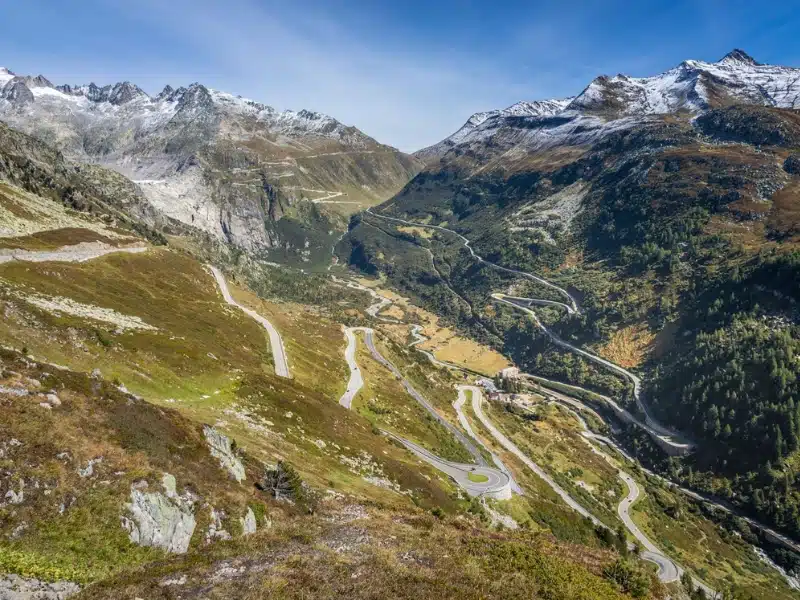
Day 6: Zermatt
The most popular activities in Zermatt are snowboarding and skiing at the award-winning Matterhorn Ski Paradise, which offers 360 km of ski runs and 54 lifts and is open year-round. Take a cable car up the slopes to reach Europe’s highest cable car station for some of the best views of the Alps mountain range.
For the best hiking, head to the Matterhorn Valley. We recommend the beautiful five lakes hike, which passes the unique lakes of the Stellisee, Grindjisee, Grünsee, Moosjisee, and Leisee, the latter of which is good for swimming. This is a moderately easy walk, and you can reach the trailhead by taking the Sunnegga funicular from Zermatt and then the gondola to Blauherd.
No trip to Zermatt is complete without a trip up the iconic Matterhorn, one of the highest summits in the Alps at a whopping 4,478m (14,692 ft) above sea level. Take the Matterhorn Glacier Paradise Cable Car or the Gornergrat Bahn Cogwheel Train to the top for panoramic views of the Swiss Alps.
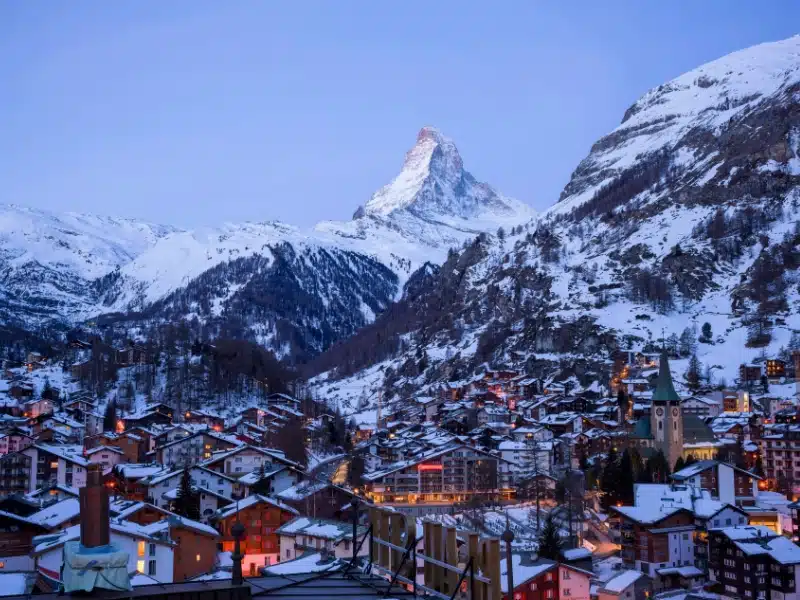
Other Nearby Road Trips
Day 7: Zermatt to Lausanne
Montreux
Stop at the Fondation Pierre Gianadda, about 63 miles west of Zermatt, on your way to Montreux. The art museum houses a range of impressive permanent and temporary collections.
Upon arrival in Montreux, start your visit at Château de Chillon (Chillon Castle). This medieval fortress is located on the eastern end of Lake Geneva and is one of Switzerland’s most visited medieval castles.
Take a stroll by the flower-lined Promenade Fleuri, which stretches along Lake Geneva, for scenic views of the mountains and lake. You can also enjoy water activities like paddleboarding and kayaking on the lake.
Visit the statue of the legendary Freddie Mercury, who moved to Montreux in 1978 to record his last album before enjoying lunch at Auberge de Chaulin or Montreux Jazz Café.
Lausanne
Lausanne is a beautiful town in the French-speaking region of Switzerland and home to the International Olympic Committee headquarters. The Olympic Museum offers interactive exhibits, memorabilia, and multimedia displays.
Explore the Lavaux wine region by taking one of several wine-tasting tours of the old town, which features medieval buildings and historic landmarks like the 12th-century Lausanne Cathedral and the Lausanne Palace, a luxury hotel since 1915. Finally, if there is time, visit the Collection de l’Art Brut, a museum that celebrates artworks created by artists without formal training.
For dinner, try Ciao Trattoria for the best Italian dishes in town or Tartares & Co Lausanne – Flon for French gastropub food.
Glacier 3000 Side Trip
Take a day trip to Glacier 3000, an alpine experience near Les Diablerets. A 15-minute cable car journey will give you a panoramic 360-degree view of the Swiss mountains.
Once at the summit, you will enjoy spectacular views of Lac Leman. The Peak Walk, the only bridge in the world connecting two summits, provides daring visitors with panoramic views of the alpine landscape.
Where to Stay in Lausanne
Upmarket: Hotel Angleterre & Résidence is a luxurious and historic hotel located on the shores of Lake Geneva. It offers guests stunning views of the lake and the Alps beyond. This elegant hotel combines classic charm with modern comforts, providing a serene retreat in the heart of Lausanne.
Mid-Range: Moxy Lausanne City is a stylish and modern hotel that caters to travelers looking for a lively and contemporary experience. The hotel features trendy, compact rooms with vibrant decor and all the essential amenities for a comfortable stay.
Budget: Hôtel du Marché is a charming boutique hotel in the Flon district, known for its vibrant atmosphere and artistic flair. This family-run hotel offers a cozy and welcoming environment, making it a popular choice for travelers seeking a personalized experience in the heart of Lausanne.
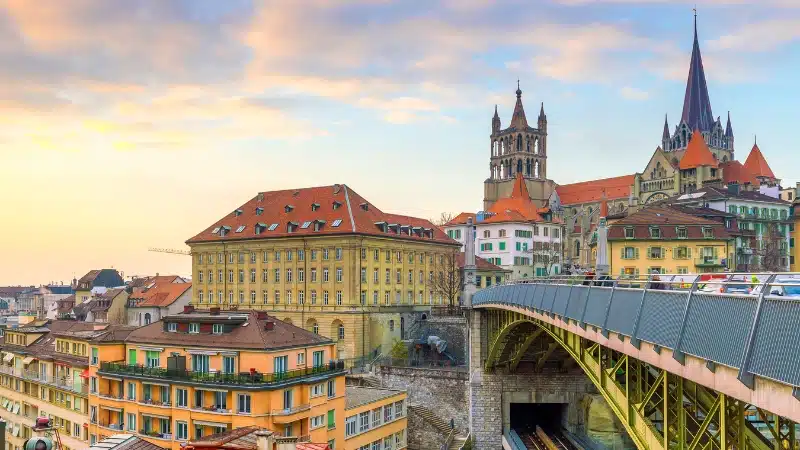
Day 8: Lausanne to Neuchâtel
Geneva
Less than an hour’s drive south of Lausanne is Geneva, best known for Lake Geneva and for being the headquarters of the United Nations. Take a guided tour to learn more about the UN’s history and work.
Stroll through the beautiful Parc des Bastions (Bastions Park) and visit the Jet d’Eau, one of Lake Geneva’s most famous landmarks. This fountain shoots about 130 US gallons of water per second 140 meters (459 ft) high into the air.
Other notable places to visit are the Gothic Cathedral of St. Pierre and the Patek Philippe Museum, which is dedicated to the art of watchmaking. It includes an impressive and feature collection of antique and modern watches.
Afterwards, treat yourself to a Michelin-star lunch at L’Agape or Bayview for views of Lac Leman.
Neuchâtel
Once in French-speaking Neuchâtel, visit the Neuchâtel Castle, located on top of a hill that overlooks the city. The castle dates to the 1100s and holds several museums, including the Historical Museum of Neuchâtel.
The town is also known for where the famous chocolatier Philippe Suchard opened his first confectionery in 1825. Try Wodey-Suchard, Jacot Haute Chocolaterie, or Walder Chocolatier for delicious treats.
Explore Neuchâtel’s Collegiate Church to marvel at the stunning stained-glass windows, organ, and view of the city from its tower. If you are a movie buff traveling during June or July, see if you can catch the annual Neuchâtel International Fantastic Film Festival.
In the Jura Mountains to the west of the city, Creux du Van is an incredible natural rock arena of immense proportions with hiking trails and panoramic views.
Dine at La Collegiale or Buffet du Funiculaire for a lovely outdoor seating area.
Where to Stay in Neuchâtel
Luxury: Hotel Palafitte is a unique and luxurious hotel located on the shores of Lake Neuchâtel, offering guests a unique experience. This extraordinary hotel is renowned for its distinctive design, featuring individual pavilions built on stilts over the water, providing stunning views of the lake and the Alps in the distance.
Mid-Range: Hôtel La Maison du Prussien is a charming boutique hotel in a historic mansion overlooking Lake Neuchâte. This elegant hotel offers a blend of classic elegance and modern comfort, providing guests with an intimate retreat.
Budget: Hôtel Des Arts is a boutique hotel with artistic flair located near the shores of Lake Neuchâtel. The hotel offers guests a stylish and contemporary environment with a focus on art and design.
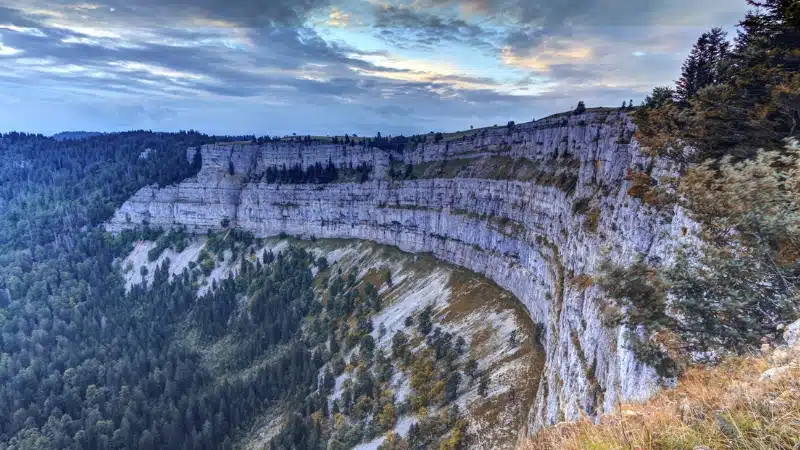
Want to plan your own road trip? Get our step-by-step road trip planning guide to help you organize the perfect trip, or check out our Europe road trip ideas.
Day 9: Neuchâtel to Basel
Bern
Bern, the capital of Switzerland, is best known for its UNESCO Old Town, its historic clock tower, the Zytglogge, one of the city’s most recognizable landmarks, and the Bear Pits, or Bärengraben, where bears have been housed since 1513 and have come to symbolize the city.
Bern offers a variety of experiences for visitors, and the best way to see the city is with our recommended guided walking tour. On this tour, you’ll admire Bern’s fountains, towers, quaint streets, and arcades as you learn about the city’s 800 years of history from a local guide.
If you travel in summer, enjoy lunch on Klosterli Weincafeor’s outdoor terrace. For something a bit more luxurious, research and book at one of the many Michelin-star restaurants around Bern.
Basel
Drive north to the picturesque town of Basel. If you haven’t had enough art museums, visit the Kunstmuseum Basel, which exhibits works by famous masters such as Pablo Picasso, Vincent van Gogh, and Claude Monet.
Walk along the Rhine River or explore the Basel Botanical Garden. It has over 7,000 different species of plants worldwide and includes a tropical greenhouse and a Japanese garden. If travel plans commence in February or March, ensure to attend the annual Basel Carnival, one of the most famous carnivals in Switzerland.
Before dinner, start with dessert by treating yourself to chocolate from Confiserie Schiesser (located on Marktplatz) or Confiserie Bachmann, which has some of the best läckerli biscuits. For dinner, go to Hostaria or Taverne Johann for a lovely Italian meal.
Where to Stay in Basel
Luxury: Grand Hotel Les Trois Rois is a legendary establishment renowned for its rich history, luxurious accommodations, and exceptional service. Situated on the banks of the Rhine River, this grand hotel dates back to the 17th century and has hosted royalty, dignitaries, and celebrities over the years.
Mid-Range: Hotel Märthof Basel is a charming boutique hotel in the city center, offering guests a cozy and welcoming atmosphere. This family-run hotel prides itself on its Swiss hospitality and personalized service, making it a popular choice for leisure and business travelers.
Budget: Hotel Spalentor is a delightful city hotel with a friendly atmosphere, distinguished by its proximity to the Spalentor, one of Basel’s historic city gates. The hotel blends modern amenities with traditional charm, providing guests a comfortable base.
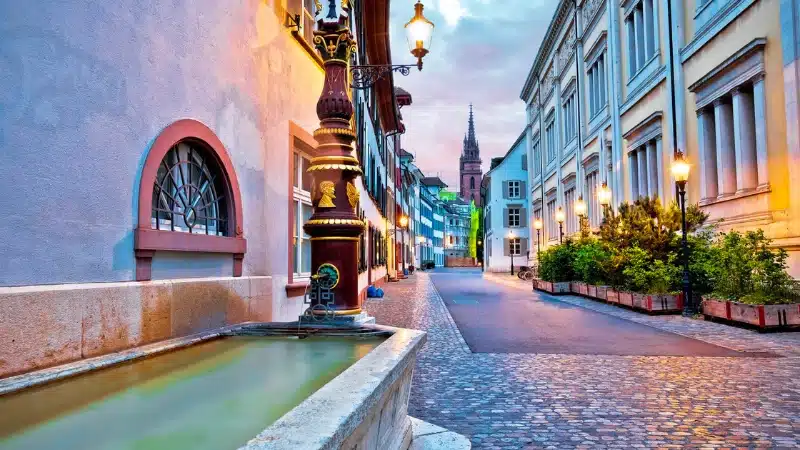
Day 10: Basel to Lucerne
Lucerne
En route to Lucerne, about 40 minutes from Basel, stop at Tüfelsschlucht Hägendorf. It is a gorgeous nature reserve and gorge, about 2.1 km long (1.3 miles), with scenic hiking trails and waterfalls.
Situated by Lake Lucerne and surrounded by the Swiss Alps, Lucerne is a beautiful city that offers something for everyone. Arguably the most iconic landmark in Lucerne and a must-see on your trip is the Kapellbrücke (Chapel Bridge), the world’s oldest surviving truss bridge. Walk across Chapel Bridge to the Water Tower, which once served as a prison.
Visit the Lion Monument, a sandstone sculpture honoring the Swiss Guards killed during the French Revolution. For those keen on more history and who love classical music, explore the Richard Wagner Museum.
You can also take this unmissable Lake Lucerne and Mount Pilatus trip, known as the golden round trip. It takes you on a boat, cogwheel railway, aerial cableway, and finally, a gondola offering panoramic views of the surrounding mountains and the city itself.
Towards the end of your final day, you can head back to north Zurich or stay in Lucerne to enjoy dinner at Pikante Peruvian Cuisine & Pisco Lounge for delicious Peruvian dishes or Richemont Gastronomie for a more European-style menu.
Mount Titlis Side Trip
A 30-minute scenic drive to Engelberg will take you to an unmissable Swiss experience. The Titlis Glacier is reached on the Rotair revolving cable car – yep, a rotating cable car!
You can also experience an unforgettable adventure on the Ice Flyer chairlift, step inside a glacier cave, and cross the Titlis cliff walk bridge suspended high over the Swiss Alps. This highly-rated half-day tour from Lucerne will transport you to Engelberg and include all the experiences Mount Titlis offers.
Where to Stay in Lucerne
Luxury: Grand Hotel National Luzern is a luxurious and historic hotel situated on the shores of Lake Lucerne. It offers guests a blend of elegance, comfort, and breathtaking views of the lake and surrounding mountains. This prestigious hotel dates back to the late 19th century and has been a symbol of luxury and hospitality in Lucerne ever since.
Mid-Range: Waldstätterhof Swiss Quality Hotel is a centrally located hotel that embodies Swiss hospitality and comfort. Situated near the historic old town and just a short walk from Lake Lucerne, this hotel offers guests a convenient base to explore the city’s cultural attractions and natural beauty.
Budget: Anstatthotel Horw is a modern and welcoming aparthotel located in Horw, just a short drive from the picturesque city of Lucerne. This contemporary hotel offers guests comfort, convenience, and flexibility, ideal for short and extended stays.
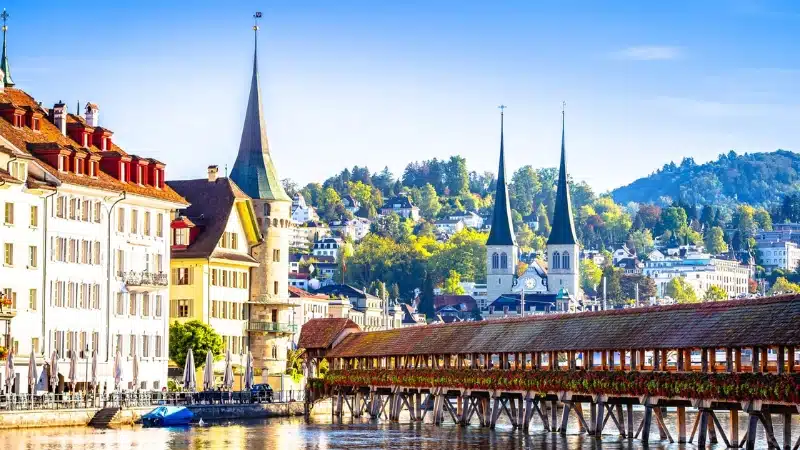
Switzerland Grand Tour: Best Time to Go
March to May
Spring is the best time to visit Switzerland, with temperatures warming up nationwide. Wildflowers are everywhere, and you’ll find the roads and cities less crowded, but most attractions will be open.
June to August
Switzerland enjoys beautiful summer weather with the prospect of hiking, biking, lake swimming, and dining al fresco. This is when locals and visitors head to the mountains and lake shores, meaning more people will be around and more traffic.
September to November
Autumn is a great time for a Swiss road trip. Grapes and crops are being harvested, and festivals celebrate the bounty of the land and cows returning from high pastures. You might enjoy an Indian summer with the fall colors of the vines aflame.
December to February
The winter in Switzerland can be very cold, but most people come to Switzerland between December and March for winter sports like skiing and snowboarding. It’s not the best time for a road trip, as the spectacular mountain passes will be closed, and roads can be challenging to drive.
RELATED POST: The Best of Switzerland in Summer: 17 Amazing Highlights
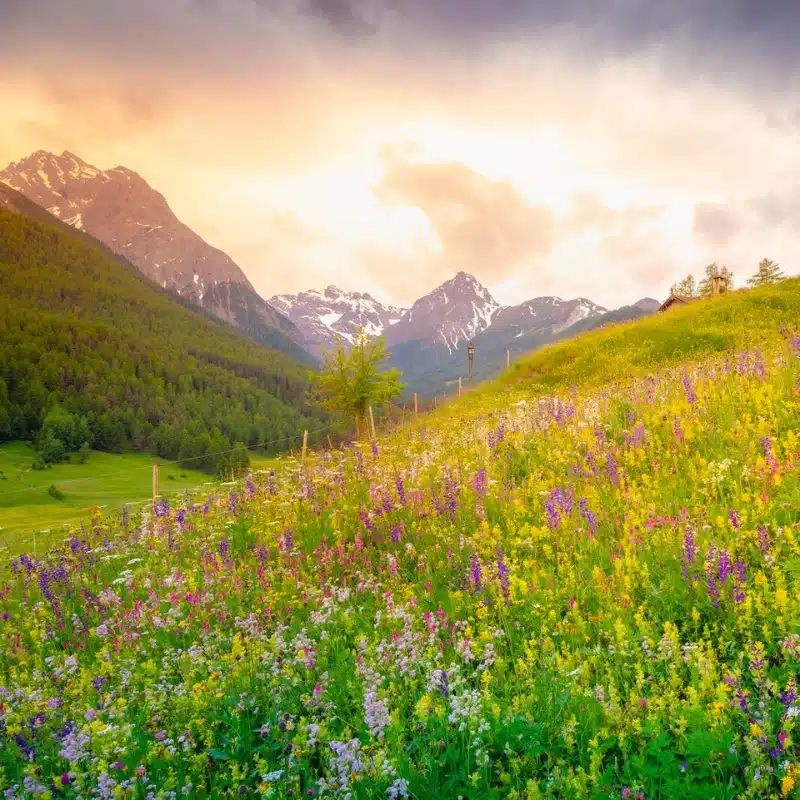
Tips for Driving in Switzerland
Traveling in Switzerland by car is a pleasure. The roads are well-maintained, and the drivers are courteous and measured. The engineering of the mountain passes and complex tunnels and bridges ribbon across the landscape is a real marvel.
Whether you’re traveling in your own vehicle or flying in and renting a car, you need to follow these rules when you drive and travel in Switzerland;
RELATED POST: Driving in Europe – Everything You Need to Know
Are you looking for more road trip inspiration? Check out these top posts…
Road Trip from Madrid: 7–10 Days Central Spain Loop
Mallorca Road Trip: 7–10 Day Island Loop from Palma
Catalonia Road Trip: 7–10 Day Costa Brava & Pyrenees Loop from Barcelona
Northern Spain Road Trip: 7–10 Day Itinerary, Route and Tips
Andalucia Road Trip: The Perfect 10-14 Day Itinerary
Spain Road Trip: 10 of the Best Routes, Regions, and Island Drives
Love it? Pin it!
